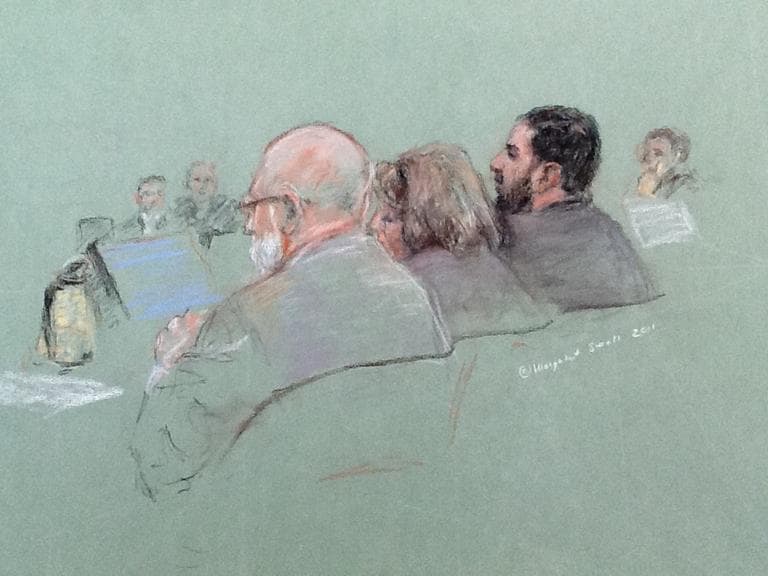Advertisement
In Mass. Terror Case, Different Descriptions Of Accused Sudbury Man

A Massachusetts man charged with conspiring to help al-Qaida was an aspiring terrorist who hoped to answer Osama bin Laden's call to fight Americans, mostly from the comfort of his "cushy" home in a Boston suburb, a federal prosecutor told a jury Thursday.
Tarek Mehanna went to Yemen looking for terrorist training, but when that failed he returned to his home in Sudbury and began translating and posting on the Internet videos and texts promoting violent jihad, Assistant U.S. Attorney Aloke Chakravarty said.
"He viewed himself as part of the media department of al-Qaida," Chakravarty said.
But Mehanna's lawyer described Mehanna as a young man from a good family "with a normal American upbringing" who was simply venting his anger over the U.S. invasion of Iraq. Mehanna's online activities amount to free speech protected by the First Amendment of the U.S. Constitution, attorney J.W. Carney Jr. told the jury.
"As Americans, we have that freedom. We can hold onto these beliefs and we can speak them, even if it upsets the federal government," Carney said.
Mehanna, 29, faces seven charges, including conspiring to provide material support to a designated terrorist organization, conspiracy to kill in a foreign country and lying to federal authorities.
Prosecutors are expected to call their first witnesses Friday. The trial is expected to last six to eight weeks. If convicted, Mehanna faces a possible sentence of lilfe in prison.
In opening statements, Chakravarty told the jury that Mehanna was among a group of young men, most of whom grew up in the suburbs of Boston, who for a period of about 10 years "were secretly plotting to attack American interests."
He said Mehanna and two other men decided they wanted to do something to participate in jihad.
"There were Muslims dying around the world and they felt it was their job to exact revenge," he said.
Chakravarty said the men considered domestic terrorism, including attacks on U.S. shopping malls and Hanscom Air Force Base in Bedford.
After the U.S. invaded Iraq in 2003, the men decided "we need to go over there, we need to fight, we need to get the training," Chakravarty said.
Mehanna and two other men, Ahmad Abousamra and Kareem Abuzahra, agreed to go to Yemen in 2004 to get terrorism training, the prosecutor said.
Abousamra fled to Syria shortly after he was questioned by the FBI, while Abuzahra is expected to be a star witness against Mehanna.
Chakravarty said that after the men failed to get into a training camp in Yemen, Mehanna returned to the United States and began translating Arabic videos and texts promoting violent jihad, including a publication entitled "39 Ways to Serve and Participate in Jihad," which the prosecutor described as a "training manual."
"You'll find that this case is not about the defendant being un-American, having unpopular thoughts, but it's about what he tried to do to support the people who were actually killing Americans," Chakravarty said.
Mehanna's lawyer told the jury that his client never acted on behalf of al-Qaida.
Carney said Mehanna was a scholar of Arabic and Islamic law, and told people he wanted to go to Yemen, a country known for having pure Arabic unpolluted by outside influences as well as religious schools.
He said Mehanna did not go to Yemen to seek terrorist training.
"Tarek wanted to visit the schools he hoped to attend sometime in the future," Carney said. He told jurors they will hear testimony that while Mehanna was in Yemen, he toured three different schools, sat in on classes and talked to students.
Carney said Mehanna felt free to express his anger over the U.S. involvement in Iraq over the Internet and in instant messages to his friends because "he felt he was doing so under the freedom granted him by the First Amendment."
Carney also said Mehanna rejected the idea of shooting up a U.S. shopping mall. He said when someone else brought up the idea, Mehanna's response was, "Oh, come on, that's ridiculous."
"What you will see in this case is that Tarek Mehanna didn't do anything," he said.
About 100 of Mehanna's supporters, including his parents and brother, packed the courthouse for the start of his trial. Two overflow courtrooms were provided to accommodate the crowd. The group chanted "Free Free Tarek" and "Justice for Tarek" outside the courthouse.
About a dozen members of Occupy Boston, a local offshoot of the Occupy Wall Street movement, also attended the trial to show support for Mehanna.
This article was originally published on October 27, 2011.
This program aired on October 27, 2011. The audio for this program is not available.